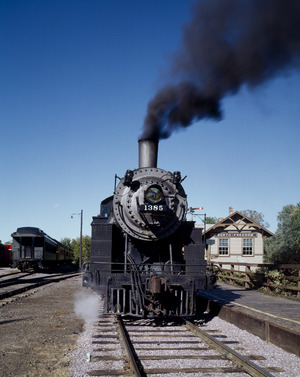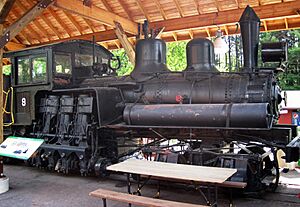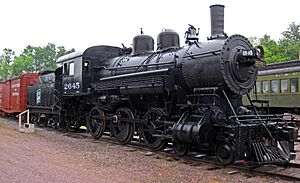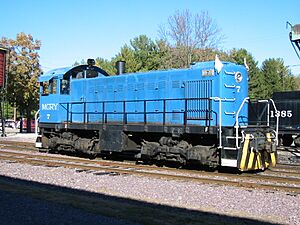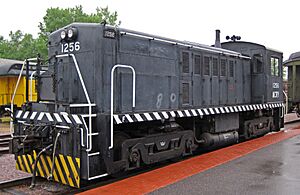Mid-Continent Railway Museum facts for kids
Quick facts for kids Mid-Continent Railway Museum |
|
|---|---|
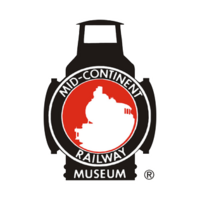 |
|
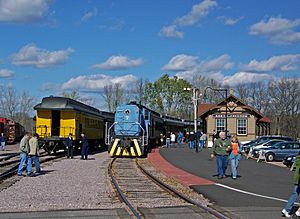
The restored 1894 Chicago and North Western depot is where visitors start their journey at the museum.
|
|
| Locale | E8948 Museum Road, North Freedom, Sauk County, Wisconsin |
| Coordinates | Lua error in Module:Coordinates at line 614: attempt to index field 'wikibase' (a nil value). |
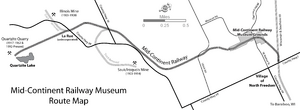
Route map of the Mid-Continent Railway Museum
|
|
| Connections | Wisconsin and Southern Railroad |
| Commercial operations | |
| Built by | Chicago and North Western Transportation Company |
| Original gauge | 4 ft 8 1⁄2 in (1,435 mm) standard gauge |
| Preserved operations | |
| Reporting mark | MCRY |
| Stations | 1 |
| Length | 3.7 miles (6.0 km) |
| Preserved gauge | 4 ft 8 1⁄2 in (1,435 mm) standard gauge |
| Commercial history | |
| Opened | 1959 |
| Closed | 2008–2009 |
| Preservation history | |
| 1959 | Railroad Historical Society of Milwaukee formed and first steam locomotive acquired |
| 1962 | Train rides first operated on the Hillsboro and Northeastern Railway and North Freedom branchline purchased |
| 1963 | Equipment moved to new location and trains first operated |
| 1965 | Depot moved from previous location |
| Headquarters | North Freedom, Wisconsin |
The Mid-Continent Railway Museum is a special museum in North Freedom, Wisconsin. It's not just a place with old trains on display. Visitors can also take a seven-mile round trip ride on historic railroad cars. It's a journey back in time to the golden age of trains!
Contents
History of the Railway
From Iron Mines to Museum
The tracks used by the museum today were once part of a busy railroad line. In 1903, the Chicago and North Western Railway built this short track to serve nearby iron mines. A new town called La Rue sprang up to support the hundreds of miners working there. The town had a hotel, a church, and even two saloons.
At its busiest, the mines shipped up to 12 train cars of iron ore every day. But this success didn't last. Water began flooding the deep mine shafts, making it very expensive to pump out. The first mine closed in 1908, and the second closed in 1914. Without the mines, the town of La Rue was quickly abandoned. Today, only one building from the old town is still standing.
After the iron mines closed, a company began quarrying quartzite rock nearby. The railroad tracks were used for this until 1962. When the quarry closed, the rail line was going to be abandoned and torn up.
Saving the Tracks
Luckily, a group of train lovers from Milwaukee had formed the Railway Historical Society of Milwaukee in 1959. They were collecting old locomotives and train cars and needed a home for them. In 1962, they heard the North Freedom tracks were for sale and bought them.
The group moved all their equipment to North Freedom. By the summer of 1963, they had repaired a steam locomotive, the No. 1385. For the first time, they offered train rides to the public. The museum has been giving rides every year since then.
A Major Flood
In June 2008, the Baraboo River flooded and covered the museum grounds in water. The museum had to close for repairs. A key bridge connecting the museum to the main U.S. rail network was also damaged. This meant no large trains or equipment could be moved to or from the museum. The bridge was finally repaired in July 2018.
Riding the Historic Trains
The museum operates a heritage railroad, which means it uses historic trains to show people what travel was like in the past. The train ride is a seven-mile round trip that takes about one hour.
The journey starts at the North Freedom depot. It passes through the old mining town of La Rue and goes to a rock quarry before returning. During the ride, a conductor in a uniform punches tickets and tells stories about railroad history.
Special Train Events
The museum also hosts special events throughout the year.
- Autumn Color weekends in the fall show off beautiful scenery.
- Pumpkin Special trains run near Halloween.
- Santa Express Weekends bring holiday cheer in late November.
- The Snow Train runs in February for a unique winter ride.
For most of its history, the museum's trains were pulled by real steam locomotives. Since 2000, diesel locomotives have been used while the steam engines are being repaired.
The Museum's Collection
The museum focuses on trains and equipment from the "Golden Age of Railroading," between 1880 and 1916. This was a time when railroads grew incredibly fast across the United States.
The museum has a large collection of historic train cars. It has the biggest collection of wooden passenger cars in the country. It also has a very rare "fish car," which was used to transport live fish to stock lakes and rivers.
The main station building, or depot, is a real depot from 1894. It was moved from the nearby town of Rock Springs in 1965. Inside, you can find waiting rooms, a ticket office, and a gift shop. The museum also has other historic railroad buildings, like a water tower and a crossing tower.
Locomotives at the Museum
Here are some of the historic locomotives you can see at the museum. "Operational" means the locomotive can run on the tracks. Others are on "static display" (for viewing only) or being restored.
| Locomotive | Image | Builder | Type | Built | Status | Previous Owner |
|---|---|---|---|---|---|---|
| Chicago and North Western 1385 | American Locomotive Company | R-1 4-6-0 steam | 1907 | Under restoration | Chicago and North Western Transportation Company | |
| Consumers Company 701 | 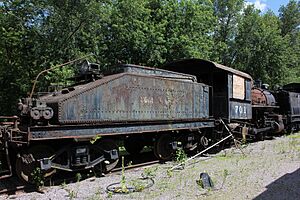 |
American Locomotive Company | 0-4-0 steam | 1914 | Stored | Consumers Company |
| Copper Range 29 | 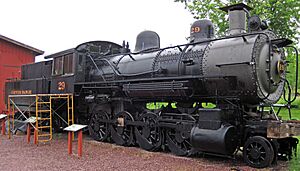 |
American Locomotive Company | C2 2-8-0 steam | 1907 | On static display | Trans-Northern |
| Dardanelle and Russellville 9 | 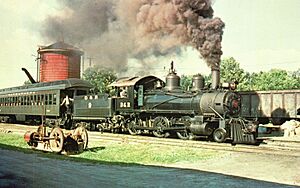 |
Baldwin Locomotive Works | 2-6-0 steam | 1884 | Undergoing cosmetic restoration | Dardanelle and Russellville Railroad |
| Goodman Lumber Company 9 | Lima Locomotive Works | Class B Shay steam | 1909 | On static display | Historyland Museum | |
| Kewaunee, Green Bay and Western 49 | 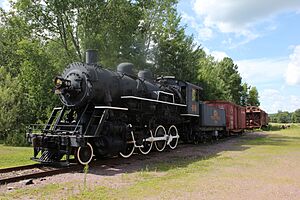 |
American Locomotive Company | 2-8-0 steam | 1929 | On static display | City of Wisconsin Rapids, Wisconsin |
| Lake Superior and Ishpeming 22 | 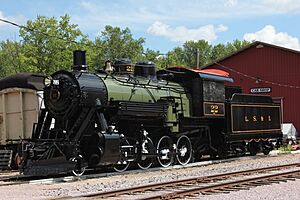 |
American Locomotive Company | SC-4 2-8-0 steam | 1910 | On static display | Marquette and Huron Mountain Railroad |
| Soo Line 2645 | Brooks Locomotive Works | E-25 4-6-0 steam | 1900 | On static display | City of Waukesha, Wisconsin | |
| Western Coal and Coke 1 |  |
Montreal Locomotive Works | 42-6-8 steam | 1993 | Disassembled, awaiting restoration | Lethbridge Collieries Limited |
| Arkansas, Louisiana and Missouri 10 | Electro-Motive Diesel | NW2 diesel | 1949 | Stored | Domtar | |
| John Morrell and Company 7 | American Locomotive Company | S-1 diesel | 1944 | Under restoration | Association of American Railroads | |
| Milwaukee Road 988 | 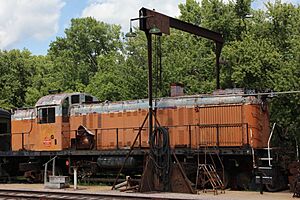 |
American Locomotive Company | RSC-2 diesel | 1947 | Under restoration | Trans-Northern Incorporated |
| Montana Western 31 | 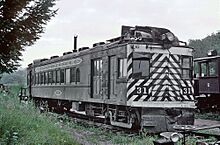 |
Electro-Motive Corporation | Gas-electric car | 1925 | Under restoration | Montana Western Railway |
| United States Army 4 | 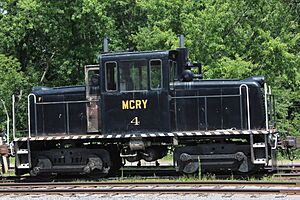 |
General Electric | 45-ton switcher diesel | 1943 | Operational | Pullman Company |
| United States Army 1256 | Baldwin Locomotive Works | RS-4-TC diesel | 1954 | Operational | United States Army | |
| Wisconsin Power and Light 3 | Plymouth Locomotive Works | 30-ton switcher diesel | 1952 | Stored | Wisconsin Power and Light Company | |
| Wisconsin Sand and Gravel 2 | 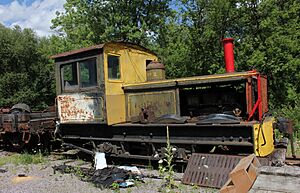 |
Plymouth Locomotive Works | HL-18 diesel | 1928 | Stored | Wisconsin Sand and Gravel Company |
Gallery
-
Duluth, Missabe and Iron Range C-74, a caboose built in 1924
See also
- List of heritage railroads in the United States
- List of railway museums
- List of historical societies in Wisconsin
 | Frances Mary Albrier |
 | Whitney Young |
 | Muhammad Ali |



